- Home
- Warhammer 40K
Miracles - Nicholas Wolf Page 3
Miracles - Nicholas Wolf Read online
Page 3
‘Did you do this to Guryn?’ I ask.
You concern yourself with matters beyond your comprehension, Jacen.
‘You showed him, didn’t you?’
The festering corpses of my children stalk the streets where I once played.
‘No!’ I scream out loud. I see more eyes turn towards me. I duck into a dark alleyway. I glance over my shoulder: I’m being followed. I know it.
I’m gasping, panting, heart racing. It’s so hot. I can’t close my eyes. All I see is death, and misery, and suffering, and horror, and–
You can prevent all of this, Jacen. Just bring me her heart.
‘I can’t do it,’ I whimper. My head is pounding. My knees are weak. ‘I can’t.’
You have to. For them.
‘How do I know this is real?’ I say to myself. ‘How do I know I’m not losing my mind, like… like my moth–’
Jacen, look at me.
‘W-what?’
LOOK AT ME.
An icy shiver runs through me at the insistency of the Angel’s voice.
I turn around, slowly. Staring from the shadows behind me are two glowing eyes. Flies buzz around me. I smell sulphur and voided bowels, curdled blood and burned flesh.
Time is running out, Jacen. Bring me your daughter’s heart, or your world will burn.
Chapter Five
My hab-unit is dark when I return home.
Power still hasn’t been returned to the worker’s hab-block. Most likely weapon production has already shifted to other manufacturing facilities across the hive, requiring power to be rerouted to ensure that the Emperor’s tithes are not late.
I slide in through the door and stumble through the familiar darkness to the kitchen.
I’m going to do it.
I have to do it.
Every time I blink I see the Angel’s vision haunting me, howling abominations defiling my family over, and over, and over as they beg for death. Every microsecond is torture. Still I make my footsteps as slow as possible as I shuffle my way towards the kitchen.
Damnation, it’s hot.
I come to the kitchen, as dark as it was in my vision. I fumble past my dinner, wrapped in sealant, to the spare bottle of amasec I keep hidden in the cabinet. Before I know it I’m gulping down the burning spirit like a man dying of thirst. The first pull is hard. The second goes down easier. I remember the night my father died… no, the night he killed himself; he was so drunk he could barely slur his words.
Wasn’t he? What had he wanted to tell me?
I wish I could remember.
The third drag banishes the worst of the bad thoughts. The familiar faux-focus of drunkenness settles on me. I clench my jaw as the haze narrows my vision and makes me forget my horror.
‘Jacen!’
I whirl around. An electro-torch illuminates the room. Myra is sitting at the kitchen table, rubbing sleep from her eyes.
Her beautiful face breaks into the widest smile I’ve seen since the days when our children were born. She jumps up from the table, throws her arms around me in a tight embrace and buries her face into my chest. Her cheeks are wet.
‘I thought you were dead,’ she whispers. ‘What happened?’
‘The manufactorum generator exploded,’ I say flatly. ‘Sabotaged, I guess.’
She makes the sign of the aquila over her chest. ‘By the Emperor,’ she whispers. ‘I’ve been listening to the vox-net, they’re saying thousands are dead. Are you okay? Are you hurt?’
‘I’m not hurt,’ I say, unable to hide my own disbelief. ‘I’m fine.’
She wipes her eyes with her sleeve. ‘How? They said the manufactorum was completely destroyed.’
I pause, seeing the form of the Angel in my mind as though it’s standing in my kitchen, urging me to fulfil the Emperor’s test.
‘It was a miracle.’
Myra gives me a strange look. Then her face breaks into a contented smile. ‘We were all praying for you. Sophya most of all. The Emperor has answered our prayers.’
I feel the tears brimming in my eyes. I grit my teeth to keep my jaw from trembling and hold her close to me so she can’t see my face.
‘I’m going to kiss the children goodnight. Why don’t you go to bed, I’ll be there in a moment and tell you all about what happened.’
Myra hugs me and kisses me, warmly, deeply. I never want it to end.
‘I love you, Jacen,’ she adds as she walks out of the kitchen.
‘I love you, too,’ I say to the shadows after she’s already left. I take a final swig of amasec to force down the lump in my throat. I stumble towards Sophya’s bed.
To do the Emperor’s bidding.
I stumble through the darkness towards the kitchen, hands slick with blood. ‘Angel!’ I call into the darkness. ‘Angel, I’ve done what the Emperor demands!’
Silence greets me.
‘Angel!’ I cry out again. ‘Angel, show yourself!’
‘I’m here,’ a sweet voice says behind me. She’s here. She’s always been here.
Elsewhere.
‘I did it…’ I say, swallowing back the tears. ‘I did… what you asked…’
Two hearts fall from my hands.
‘Myra…’ I whisper. ‘She heard Sophya. She didn’t understand. I had to do it.’
‘You did,’ she says from the shadows. ‘And you did marvellously. Better than I could have expected.’
‘I didn’t want to…’ I say to the shadows. ‘I… I didn’t ask for any of this. But I did it. Now what happens?’
‘What do you mean, Jacen?’ the Angel asks pleasantly.
‘You know what I mean!’ I snap angrily. ‘How is the Emperor going to… you know, use me to save this world?’
The Angel pauses. ‘Oh, the planet will be saved…’
My mind races. What had I been imagining would happen? Something… divine? Holy? ‘But… how? When?’ I ask, feeling the blood on my hands begin to clot. Flies buzz around me. Nausea twists my gut.
‘When enough sacrifices have been made, Jacen,’ the Angel says behind me. ‘When rivers of blood drown the world, and the corpses of the innocent blot out the sun.’
My daughter’s blood, my wife’s blood, is drying on my hands. My sons will be scarred for the rest of their lives, just like I was. The horror of what I’ve done crashes down on me again, and again, and again.
I suddenly feel my mother’s gentle hand on my shoulder. ‘There, there,’ she coos, her voice suddenly changing, deepening. ‘I understand. Some of us are chosen for great and terrible things…’
I slowly open my eyes and look behind me.
The hand on my shoulder is a malformed claw, chalk-white flesh and cracked, jaundiced talons. Her arms are too long, her body gaunt and withered. Her mouth is a grinning lamprey maw of serrated fangs weeping corruption. Her eyes are sunken pits, buzzing with flies.
This isn’t my mother. This is something wearing my mother like a skin.
‘…Just like I was.’
My mouth stretches in a soundless scream as the monster draws me into a loving embrace. Witch-light blazes from her rotten eyes. The laughter of madmen and the wailing of the damned fills my skull. The abyssal horror of the warp yawns before me, a thousand times more terrible than the haunting vision I’d seen before.
Salivating.
Hungry.
Eternal.
‘And now, my son,’ the creature that was my mother hisses as it consumes me, ‘we can be together forever.’
About the Author
Nicholas Wolf is an author, artist and occasional musician. He’s written science fiction for several publications, and his work includes the Warhammer 40,000 short stories ‘Reborn’ and ‘Negavolt’ for Black Library. He lives and works in Arizona, with his family.
An extrac
t from The Wicked and the Damned.
The sky was on fire.
As beginnings go, I think it has poetry. We were at war – when are we not? – and the world was burning beneath us. Beneath me. The air tasted of smoke and the heat pressed down on me, like the hand of the God-Emperor. My ears were ringing, but I could hear men screaming, up and down the trench-line. They were always screaming. Crying and wailing. My regiment was mostly made up of cowards and children, much to my chagrin.
The ferrocrete duckboards buckled beneath me as I pushed myself to my feet and fumbled for the laspistol on my hip. The mud – we’d taken to calling it ‘the soup’, for obvious reasons – beneath the duckboards was boiling from the heat of the barrage. The trench was sloughing into a new shape around me as I stumbled towards the nearest screams. The walls bubbled, bulging outwards or collapsing inwards. The ferrocrete frames of the line were cracked and pushed out of joint. Sometimes whole sections of the line – and everything in them – vanished into the soup. Like they’d never existed at all.
War is a hungry beast, and it gobbles its prey. A regiment can die in a moment, triumph can turn to tragedy, victory to defeat. Only by maintaining discipline can the hunger of war be held at bay. But discipline, like ferrocrete, can crack and burst, and vanish under the mud, unless someone tends to it.
Men moved around me, but I barely saw them – grey shadows, uniforms coated with mud and ash, environment masks giving everyone the same inhuman features. I didn’t often wear my mask, despite the way the heat bit at my lungs and sinuses. I wanted them to see me. To see my face. To see that I wasn’t like them. They needed to be reminded of that. I needed to be reminded of that. Standards – discipline – had to be maintained.
Coughing, I stumbled down the line, shoving men aside. They didn’t protest, or I didn’t hear them if they did. They saw my face, the black peaked cap, the coat – stained with mud though it was – and they knew me. Knew who I was, what I was. And they straightened at their positions. They went quiet. Like good soldiers.
But where there are good soldiers there are bad soldiers. There are always bad soldiers, in every regiment. The lazy and the cowardly. The unscrupulous and the mad. The God-Emperor saw them, and I saw them too. I had been trained my whole life to see them. To see the signs of faltering courage in a man, sometimes before the soldier in question even realised it. And then, to act.
Cowardice could spread like an illness, if left unchecked. And not just cowardice. Licentiousness, disrespect… these found fertile soil in untended souls. If not dealt with, they could bring a regiment to its knees. Cripple it, or even destroy it.
But not that day. Not then, with the sky burning with chemical fire and the trenches turning to soup around me. The screaming was bad for morale. Bad for the regiment. And I knew my duty.
Laspistol in hand, I swept down the line, moving quicker. The longer the screams went on, the worse the effect would be. Another lesson learned in the schola progenium. They’d taught me so many valuable things, there. I give thanks to the God-Emperor every night for those times, gruelling though they were.
The trenches I passed through were irregular canyons of mud, bolstered by support slabs of ferrocrete. In places, pre-fab bunkers of stone and metal had been sunk into the mud, their regimental markings obscured by grime and damage. Heavy environment netting had been strung over the tops of some places, in order to keep out the worst of the inclement weather. It didn’t work here – it rarely worked anywhere. But we strung it regardless, as the manuals insisted. We dug our trenches to regulation depth, despite the mud, and set our guns and placed our emplacements.
There is a right way to do things, and a wrong way. I know this. Another lesson, and one I took readily to heart. The right way was the way the God-Emperor wished it to be. The wrong way was the way of heresy, of disrespect and ill-discipline.
Armaplas firing pavises lined the top of the trenches, and men lined up behind them, standing on overturned crates or ferrocrete slabs. The sound of las-fire split the air as the soldiers vented their frustrations on the unseen enemy. It was always the same – during or just after a barrage, they would expend valuable charges from their lasrifles. The officers had given up trying to stop them from shooting at ghosts.
An odd word, that. Ghosts. But appropriate, I think, given our foe. They pounded us from afar, rarely daring to draw close. Rarely deigning, I should say. I couldn’t remember a day without their guns. Without that hateful rhythm. Even when they were silent, the air echoed with them. I couldn’t escape, even in sleep. If not for my training, I might well have been driven mad by it.
Some, among my charges, had been. The incessant bombardment ate away at their simple psyches, breaking their minds and spirits. When that happened, I had to be quick. I couldn’t allow the weakness to spread.
I reached the source of the screams after a few moments of laboured stumbling, and shoved my way through the grey crowd of masked loiterers. ‘Back to your positions,’ I growled, shoving men against the sides of the trench. ‘Get back. Back!’
They muttered darkly, their voices muffled by their masks, but they knew better than to argue. Arguing with a commissar was the equivalent of sleeping beneath a battle tank – one could get away with it, but only rarely.
When the space had cleared, I saw the screamer. He was young, and had torn his mask off, exposing milk-pale features and eyes so blue that I thought at first he’d suffered some injury. His uniform was spattered with mud and ash, and his weapon was nowhere to be seen. A medical corpsman crouched beside him, the caduceus on his shoulder plate faded and all but scraped away. The screamer did not appear to be injured. I holstered my weapon.
‘Why is he screaming?’
The corpsman looked up at me, eyes wide. He mumbled something, his voice muffled by his mask. I had never met a corpsman of any use. I shoved him aside and caught the screamer by the collar. He thrashed in my grip, boneless, like a worm. He babbled nonsense in that slurring dialect of Low Gothic shared by most of the regiment. I had never bothered to learn it, as most of them eventually figured out the right way to talk.
‘On your feet,’ I said, dragging him upright. ‘Answer me.’
His hand flapped uselessly at the wall of the trench, where bones were being squeezed from the mud like excrement. Skulls and femurs and shattered ribcages. The refuse of the battlefield. The mud cooked the dead, if the corpsmen didn’t get to them first. It boiled away the meat and muscle, leaving only bone. I paused, taking in the sight.
Sometimes, when the trenches clenched just right, the bones surfaced. They poured down and pooled across the floor of the trench. Most were reabsorbed before the trench settled, but sometimes they remained. I shoved the man back and plucked a steaming skull free of the soup. I held it up before him.
‘This? This is what you’re screaming about?’ I caught him again, before he could turn away. He was a coward, then. Like all of them. What use is a soldier that can’t face death? Like a gun that won’t fire.
The air shuddered as the dull crump of enemy artillery sounded. The trench shook and twisted as men lost their footing or fought to brace the ferrocrete slabs that held the bulk of the mud at bay. Fearful eyes darted in wild circles behind masks. A babble of voices rose. Between the mud and the screamer’s wails, they were on edge.
Discipline had to be maintained. And I had to be the one to do it.
I caught him by his flak armour and dragged him close. ‘Be quiet,’ I said. ‘Quiet!’ But he didn’t stop. Perhaps he couldn’t. I am no expert in the ways of the mind. Perhaps his had broken in such a way that the world about him had been reduced to something so infinitely terrifying that he could think of no other option than to scream and scream and scream… the noise of it was like a knife, digging into my head. Worse than the guns, almost.
I had to silence him. For the good of the regiment. For the sake of discipline. I dragged hi
m towards the collapsed wall of the trench, and the bones. He tried to twist away, hands flapping at my arm. Weak blows. Weak mind. Weak link. I tossed the skull I held aside, and drove him face-first into the tide of bones.
‘Idiot,’ I snapped. ‘Coward. The dead can’t hurt you. But I will, if you don’t stop this foolishness.’
He struggled in my grip, whining. The corpsman had fallen over and scrambled back, and the others were watching. Staring. I wanted them to. I wanted them to see that there was nothing to be frightened of here. Nothing except me.
His scream changed, became a wail of desolation – a child’s cry. Weak, as I said. Too young for the battlefield, perhaps. But the God-Emperor had chosen him – had brought him here. The least he could do was show some courage. That was all He asked of His servants. The courage to do what was necessary, whatever the cost. I said this to him, to them all, as I held him there, in the mud, ignoring his struggles. The opportunity to impart a lesson was not to be ignored, even amidst the confusion of an artillery barrage.
His struggles grew more frenzied. I forced him deeper, until the bones were tumbling over my arms and slapping against my chest. His boots caught me in the shin as his hands dug futilely into the mud either side of his head. He clawed at the wall of the trench, still screaming, though I could only hear the barest edge of it over the guns.
And then, all at once, he went still. It was so sudden, I almost released him. But I didn’t. I held him for a moment more. Maybe two. I had to make sure, you see. He needed to understand the crime he had committed. Cowardice was the weed in the garden of victory. Fear, the vice of the weak. And I would suffer no weakness in my regiment.
When I finally hauled him back, it was clear that I had overestimated him. He had been weaker than I had imagined. I knew, in that moment, that I had done him a favour, and it annoyed me. Weakness was to be punished, not rewarded.
He was a deadweight in my hands and I let him fall. His body crashed to the duckboards and lay unmoving. His blue eyes, wide and empty, stared at nothing. I felt the gazes of the rest settle on me like hands and I turned, meeting their bewildered stares unflinchingly.

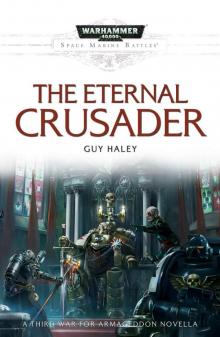 The Eternal Crusader - Guy Haley
The Eternal Crusader - Guy Haley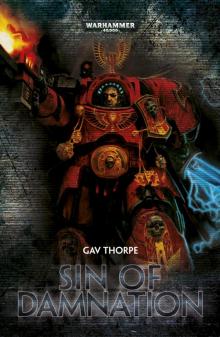 Sin of Damnation - Gav Thorpe
Sin of Damnation - Gav Thorpe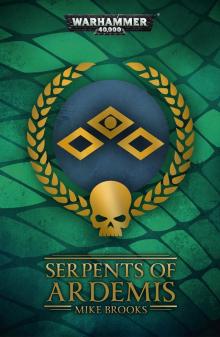 Serpents of Ardemis - Mike Brooks
Serpents of Ardemis - Mike Brooks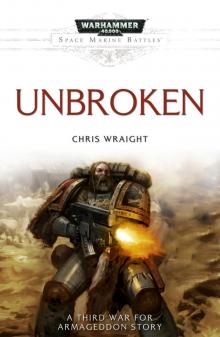 Unbroken - Chris Wraight
Unbroken - Chris Wraight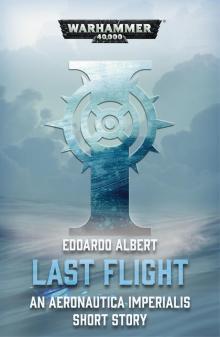 Last Flight - Edoardo Albert
Last Flight - Edoardo Albert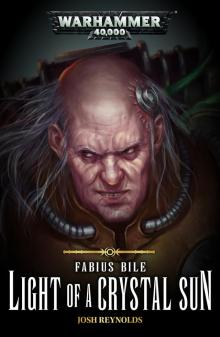 Light of a Crystal Sun - Josh Reynolds
Light of a Crystal Sun - Josh Reynolds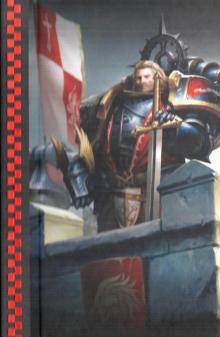 Lion El'Jonson- Lord of the First - David Guymer
Lion El'Jonson- Lord of the First - David Guymer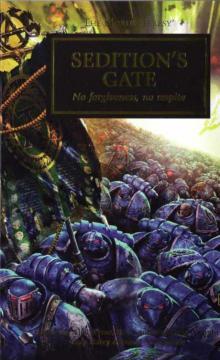 Sedition's Gate - Nick Kyme & Chris Wraight
Sedition's Gate - Nick Kyme & Chris Wraight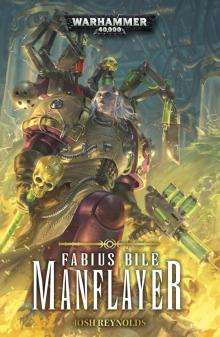 Manflayer - Josh Reynolds
Manflayer - Josh Reynolds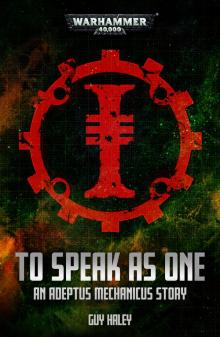 To Speak as One - Guy Haley
To Speak as One - Guy Haley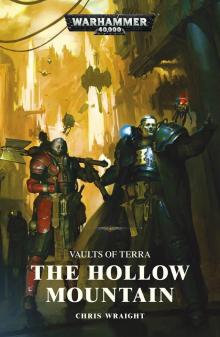 Vaults of Terra- The Hollow Mountain - Chris Wraight
Vaults of Terra- The Hollow Mountain - Chris Wraight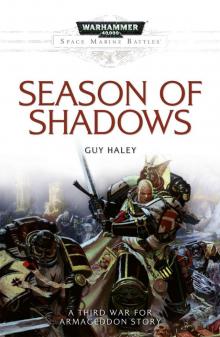 Season of Shadows - Guy Haley
Season of Shadows - Guy Haley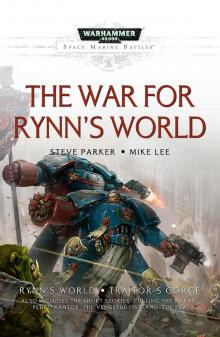 The War for Rynn's World - Steve Parker & Mike Lee
The War for Rynn's World - Steve Parker & Mike Lee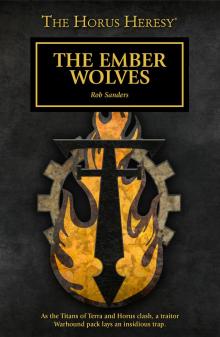 The Ember Wolves - Rob Sanders
The Ember Wolves - Rob Sanders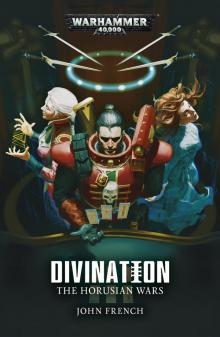 Divination - John French
Divination - John French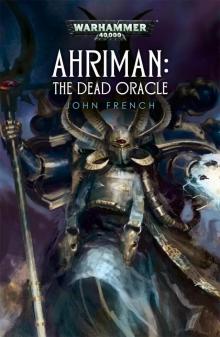 The Dead Oracle - John French
The Dead Oracle - John French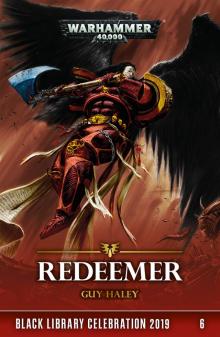 Redeemer - Guy Haley
Redeemer - Guy Haley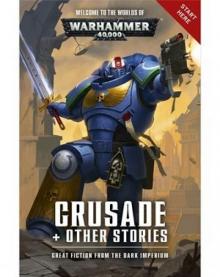 Crusade & Other Stories - Dan Abnett Et Al.
Crusade & Other Stories - Dan Abnett Et Al.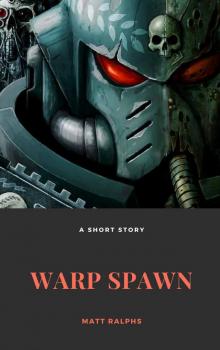 Warp Spawn - Matt Ralphs
Warp Spawn - Matt Ralphs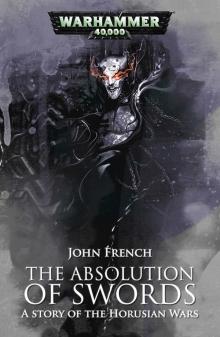 The Absolution of Swords - John French
The Absolution of Swords - John French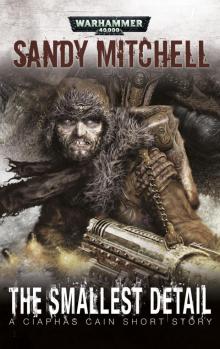 The Smallest Detail - Sandy Mitchell
The Smallest Detail - Sandy Mitchell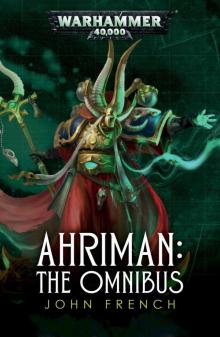 The Omnibus - John French
The Omnibus - John French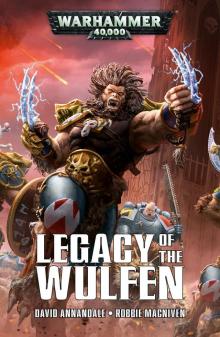 Legacy of the Wulfen - David Annandale & Robbie MacNiven
Legacy of the Wulfen - David Annandale & Robbie MacNiven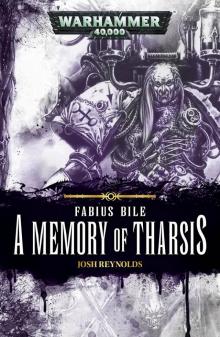 A Memory of Tharsis - Josh Reynolds
A Memory of Tharsis - Josh Reynolds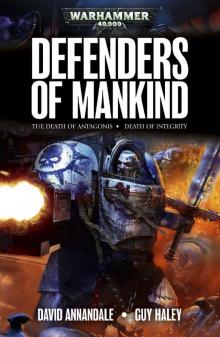 Defenders of Mankind - David Annandale & Guy Haley
Defenders of Mankind - David Annandale & Guy Haley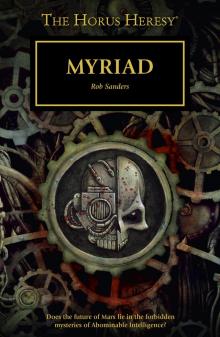 Myriad - Rob Sanders
Myriad - Rob Sanders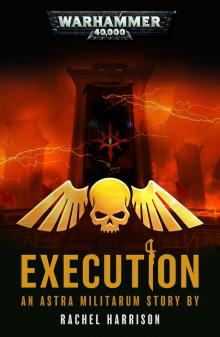 Execution - Rachel Harrison
Execution - Rachel Harrison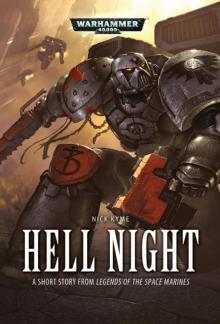 Hell Night - Nick Kyme
Hell Night - Nick Kyme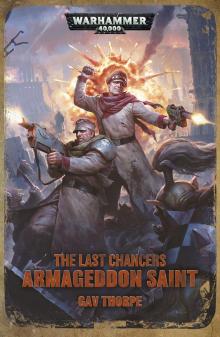 Armageddon Saint - Gav Thorpe
Armageddon Saint - Gav Thorpe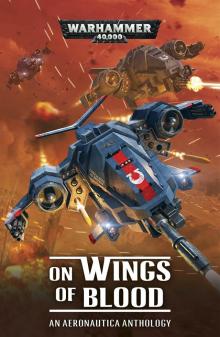 On Wings of Blood
On Wings of Blood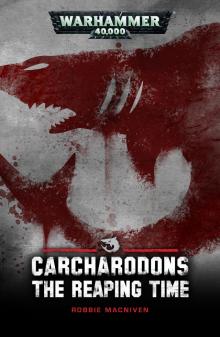 The Reaping Time - Robbie MacNiven
The Reaping Time - Robbie MacNiven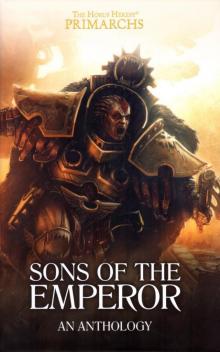 Sons of the Emperor
Sons of the Emperor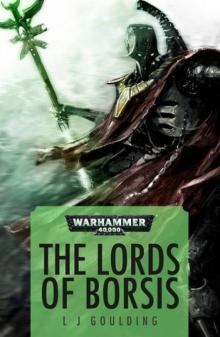 The Lords of Borsis - L J Goulding
The Lords of Borsis - L J Goulding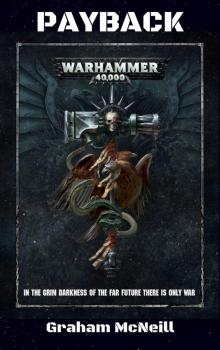 Payback - Graham McNeill
Payback - Graham McNeill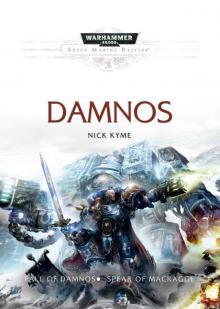 Damnos - Nick Kyme
Damnos - Nick Kyme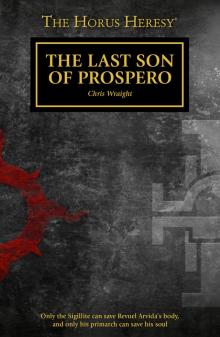 The Last Son of Prospero - Chris Wraight
The Last Son of Prospero - Chris Wraight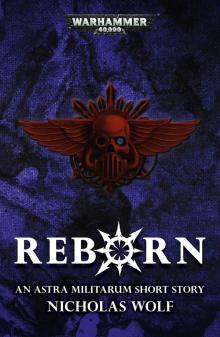 Reborn - Nicholas Wolf
Reborn - Nicholas Wolf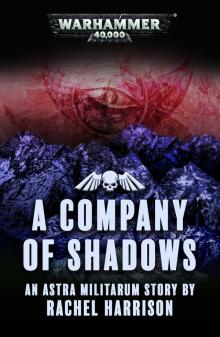 A Company of Shadows - Rachel Harrison
A Company of Shadows - Rachel Harrison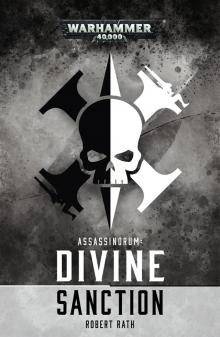 Assassinorum- Divine Sanction - Robert Rath
Assassinorum- Divine Sanction - Robert Rath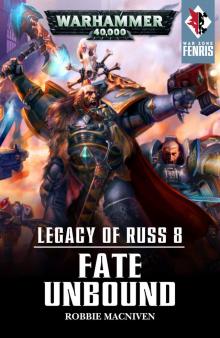 Fate Unbound - Robbie MacNiven
Fate Unbound - Robbie MacNiven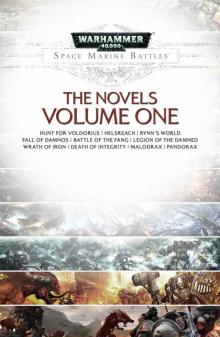 Space Marine Battles - the Novels Volume 1
Space Marine Battles - the Novels Volume 1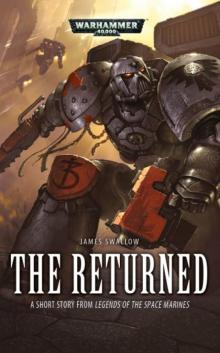 The Returned - James Swallow
The Returned - James Swallow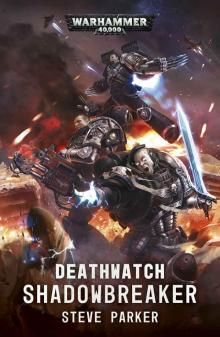 Shadowbreaker - Steve Parker
Shadowbreaker - Steve Parker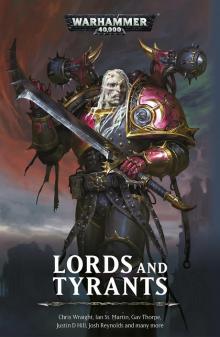 Lords and Tyrants
Lords and Tyrants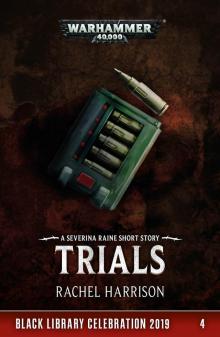 Trials - Rachel Harrison
Trials - Rachel Harrison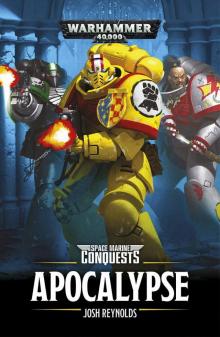 Apocalypse - Josh Reynolds
Apocalypse - Josh Reynolds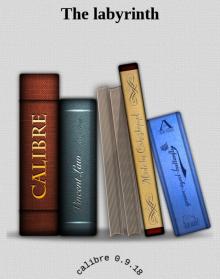 The labyrinth - Richard Ford
The labyrinth - Richard Ford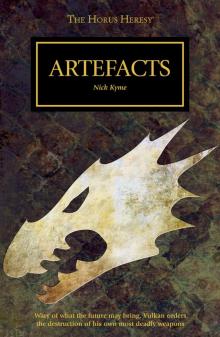 Artefacts - Nick Kyme
Artefacts - Nick Kyme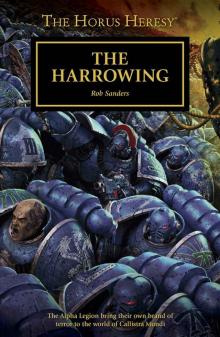 The Harrowing - Rob Sanders
The Harrowing - Rob Sanders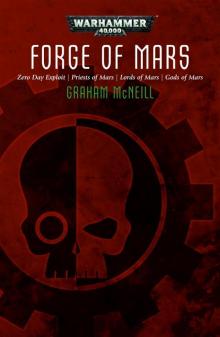 Forge of Mars - Graham McNeill
Forge of Mars - Graham McNeill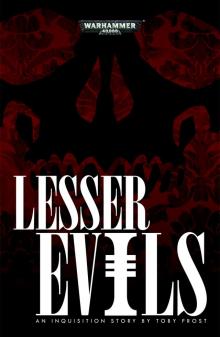 Lesser Evils - Toby Frost
Lesser Evils - Toby Frost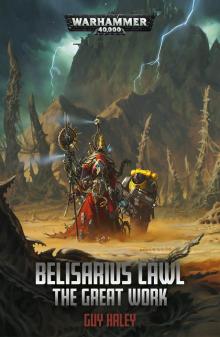 Belisarius Cawl- the Great Work - Guy Haley
Belisarius Cawl- the Great Work - Guy Haley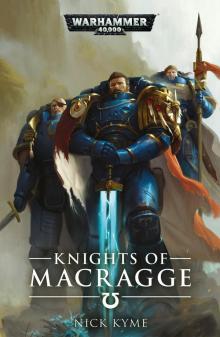 Knights of Macragge - Nick Kyme
Knights of Macragge - Nick Kyme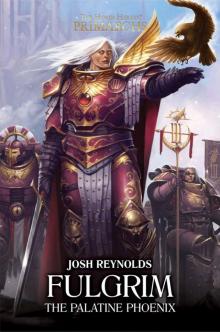 Fulgrim- The Palatine Phoenix - Josh Reynolds
Fulgrim- The Palatine Phoenix - Josh Reynolds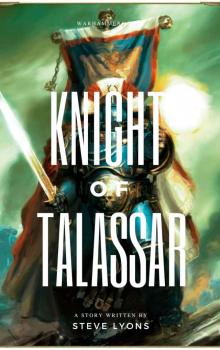 Knight of Talassar - Steve Lyons
Knight of Talassar - Steve Lyons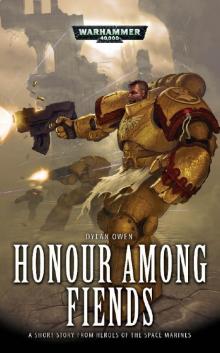 Honour Among Fiends - Dylan Owen
Honour Among Fiends - Dylan Owen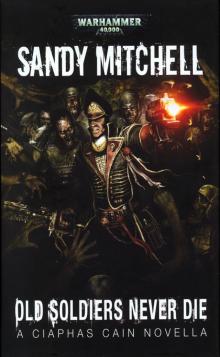 Old Soldiers Never Die - Sandy Mitchell
Old Soldiers Never Die - Sandy Mitchell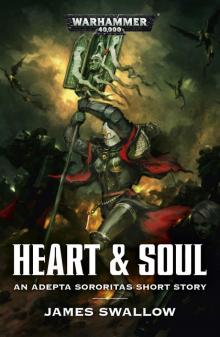 Heart & Soul - James Swallow
Heart & Soul - James Swallow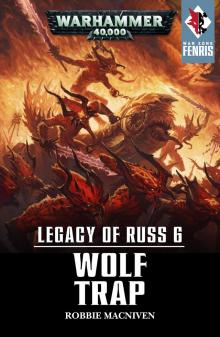 Wolf Trap - Robbie MacNiven
Wolf Trap - Robbie MacNiven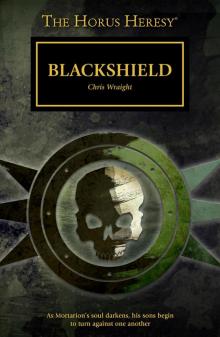 Blackshield - Chris Wraight
Blackshield - Chris Wraight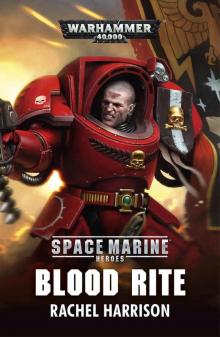 Blood Rite - Rachel Harrison
Blood Rite - Rachel Harrison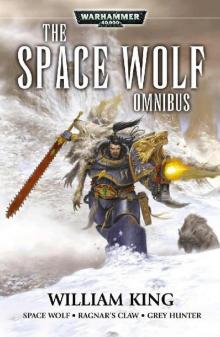 The Space Wolf Omnibus - William King
The Space Wolf Omnibus - William King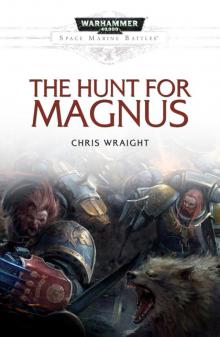 The Hunt for Magnus - Chris Wraight
The Hunt for Magnus - Chris Wraight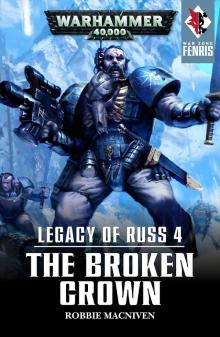 The Broken Crown - Robbie MacNiven
The Broken Crown - Robbie MacNiven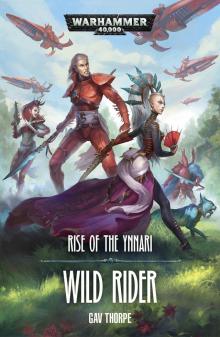 Wild Rider - Gav Thorpe
Wild Rider - Gav Thorpe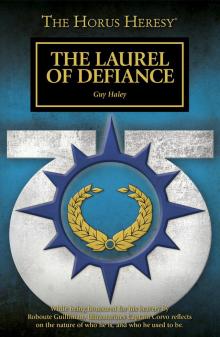 The Laurel of Defiance - Guy Haley
The Laurel of Defiance - Guy Haley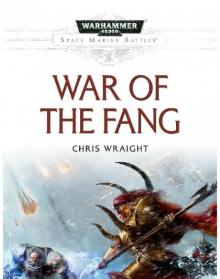 War of the Fang - Chris Wraight
War of the Fang - Chris Wraight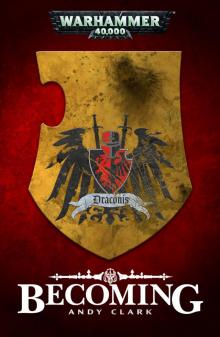 Becoming - Andy Clark
Becoming - Andy Clark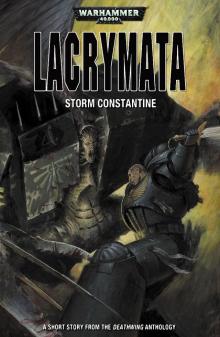 Lacrymata - Storm Constantine
Lacrymata - Storm Constantine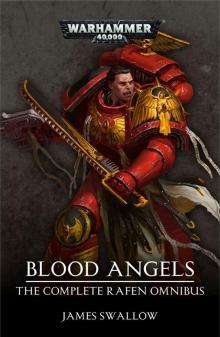 Blood Angels - The Complete Rafen Omnibus - James Swallow
Blood Angels - The Complete Rafen Omnibus - James Swallow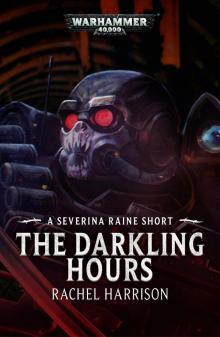 The Darkling Hours - Rachel Harrison
The Darkling Hours - Rachel Harrison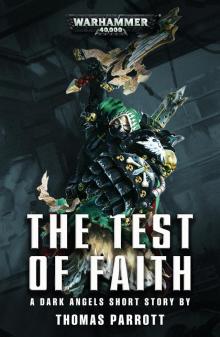 The Test of Faith - Thomas Parrott
The Test of Faith - Thomas Parrott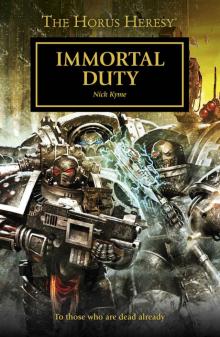 Immortal Duty - Nick Kyme
Immortal Duty - Nick Kyme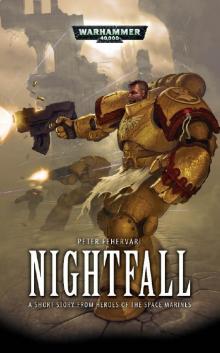 Nightfall - Peter Fehervari
Nightfall - Peter Fehervari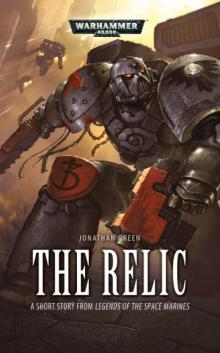 The Relic - Jonathan Green
The Relic - Jonathan Green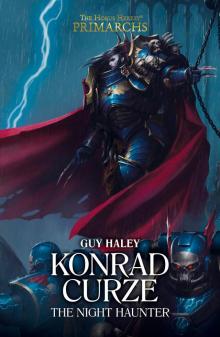 Konrad Curze the Night Haunter - Guy Haley
Konrad Curze the Night Haunter - Guy Haley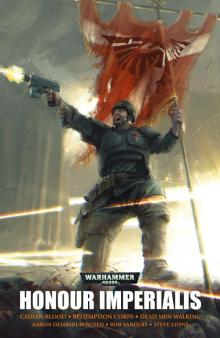 Honour Imperialis - Aaron Dembski-Bowden
Honour Imperialis - Aaron Dembski-Bowden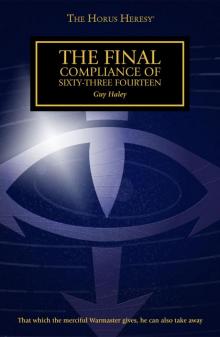 The Final Compliance of Sixty-Three Fourteen - Guy Haley
The Final Compliance of Sixty-Three Fourteen - Guy Haley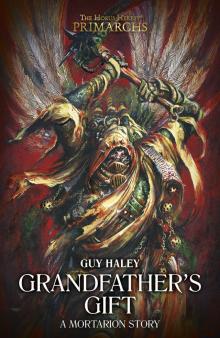 Grandfather’s Gift - Guy Haley
Grandfather’s Gift - Guy Haley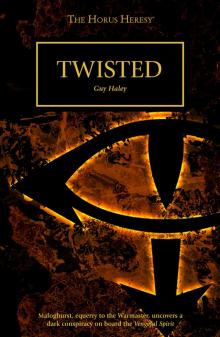 Twisted - Guy Haley
Twisted - Guy Haley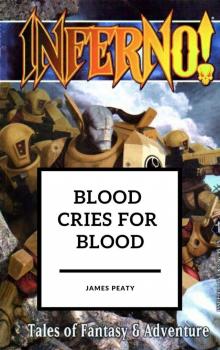 Blood Cries for Blood - James Peaty
Blood Cries for Blood - James Peaty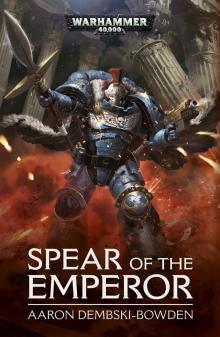 Spear of the Emperor - Aaron Dembski-Bowden
Spear of the Emperor - Aaron Dembski-Bowden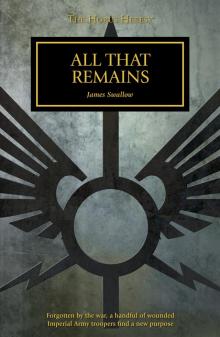 All That Remains - James Swallow
All That Remains - James Swallow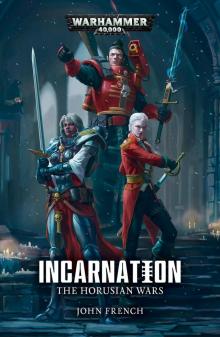 Incarnation - John French
Incarnation - John French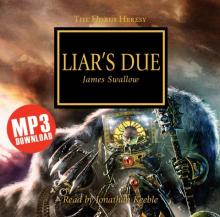 Liar's Due - Ben Swallow
Liar's Due - Ben Swallow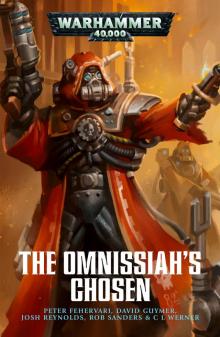 The Omnissiah's Chosen - Peter Fehervari
The Omnissiah's Chosen - Peter Fehervari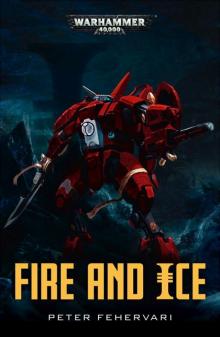 Fire and Ice - Peter Fehervari
Fire and Ice - Peter Fehervari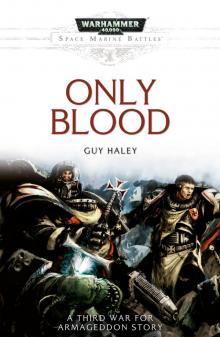 Only Blood - Guy Haley
Only Blood - Guy Haley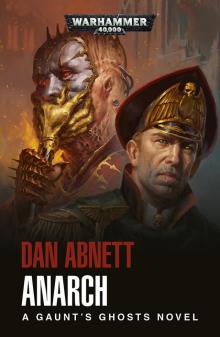 Anarch - Dan Abnett
Anarch - Dan Abnett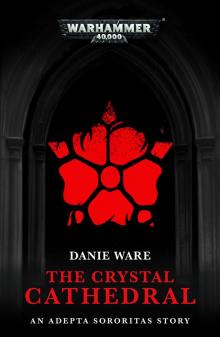 The Crystal Cathedral - Danie Ware
The Crystal Cathedral - Danie Ware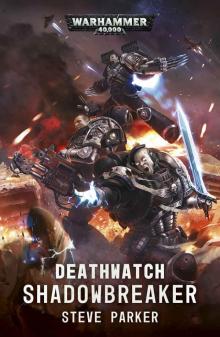 Shadowbreaker
Shadowbreaker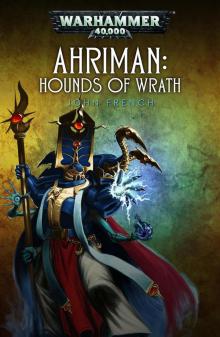 Hounds of Wrath - John French
Hounds of Wrath - John French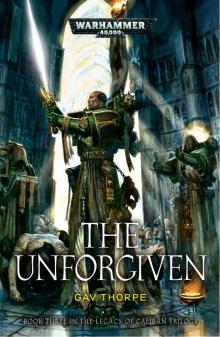 The Unforgiven - Gav Thorpe
The Unforgiven - Gav Thorpe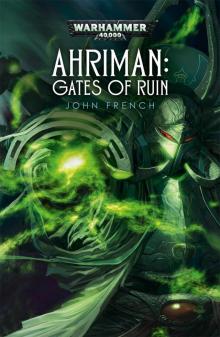 Gates of Ruin - John French
Gates of Ruin - John French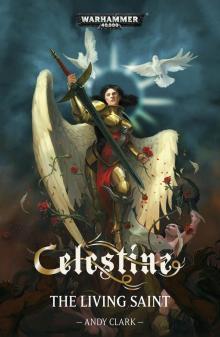 Celestine - Andy Clark
Celestine - Andy Clark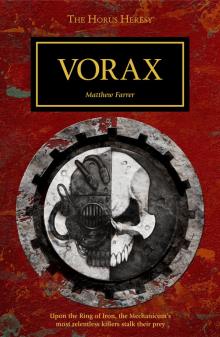 Vorax - Matthew Farrer
Vorax - Matthew Farrer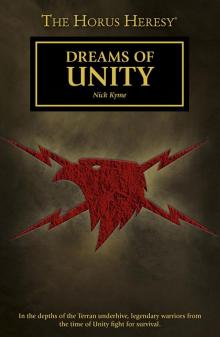 Dreams of Unity - Nick Kyme
Dreams of Unity - Nick Kyme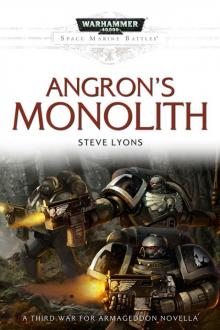 Angron's Monolith - Steve Lyons
Angron's Monolith - Steve Lyons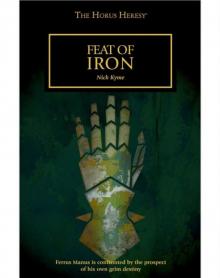 Feat of Iron - Nick Kyme
Feat of Iron - Nick Kyme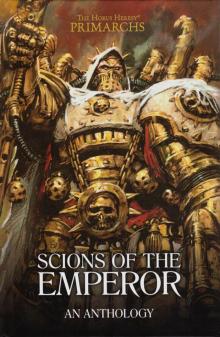 Scions of the Emperor
Scions of the Emperor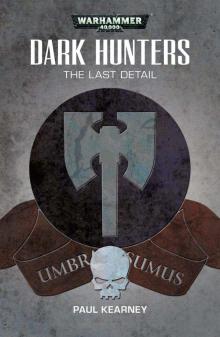 The Last Detail - Paul Kearney
The Last Detail - Paul Kearney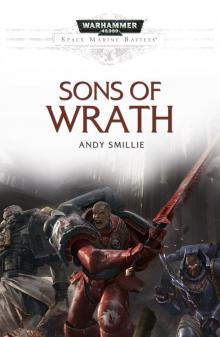 Sons of Wrath - Andy Smillie
Sons of Wrath - Andy Smillie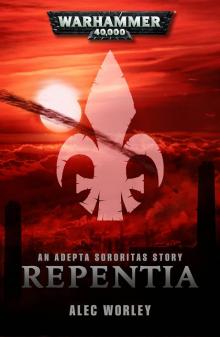 Repentia - Alec Worley
Repentia - Alec Worley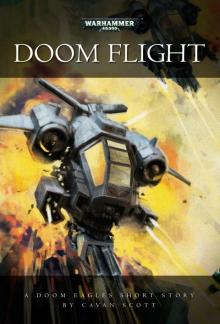 Doom Flight - Cavan Scott
Doom Flight - Cavan Scott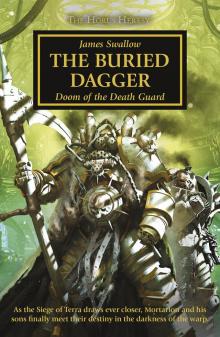 The Buried Dagger - James Swallow
The Buried Dagger - James Swallow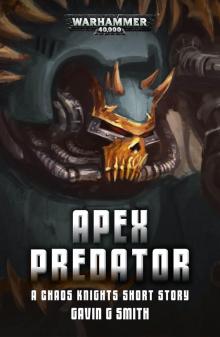 Apex Predator - Gavin G Smith
Apex Predator - Gavin G Smith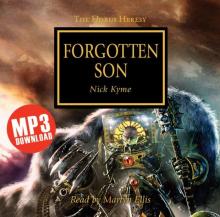 Forgotten Sons - Nick Kyme
Forgotten Sons - Nick Kyme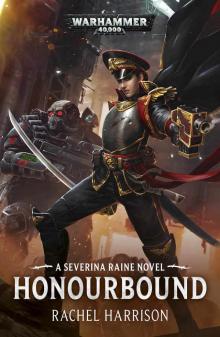 Honourbound - Rachel Harrison
Honourbound - Rachel Harrison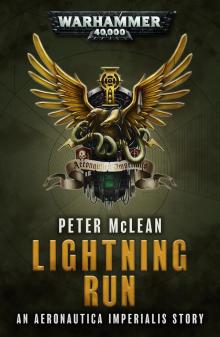 Lightning Run - Peter McLean
Lightning Run - Peter McLean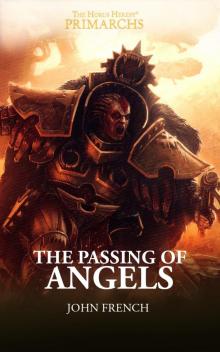 The Passing of Angels - John French
The Passing of Angels - John French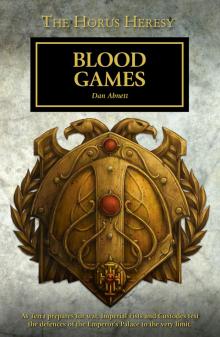 Blood Games - Dan Abnett
Blood Games - Dan Abnett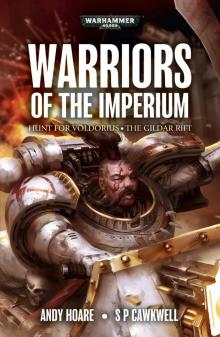 Warriors of the Imperium - Andy Hoare & S P Cawkwell
Warriors of the Imperium - Andy Hoare & S P Cawkwell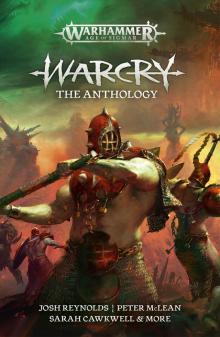 Warcry
Warcry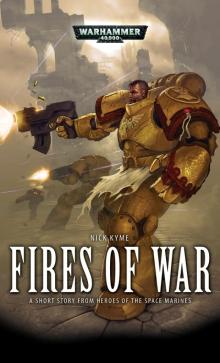 Fires of War - Nick Kyme
Fires of War - Nick Kyme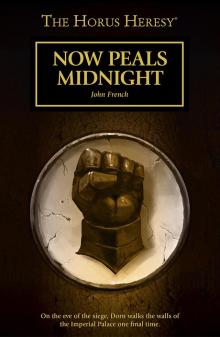 Now Peals Midnight - John French
Now Peals Midnight - John French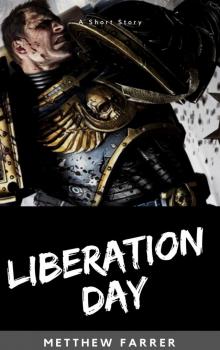 Liberation Day - Matthew Farrer
Liberation Day - Matthew Farrer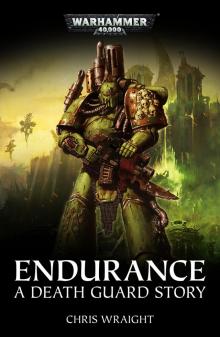 Endurance - Chris Wraight
Endurance - Chris Wraight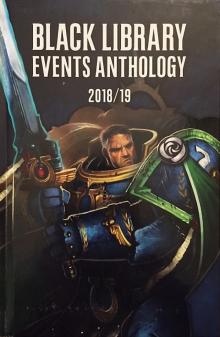 Black Library Events Anthology 2018-19
Black Library Events Anthology 2018-19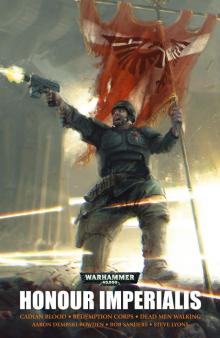 Honour Imperialis - Braden Campbell & Aaron Dembski-Bowden & Chris Dows & Steve Lyons & Rob Sanders
Honour Imperialis - Braden Campbell & Aaron Dembski-Bowden & Chris Dows & Steve Lyons & Rob Sanders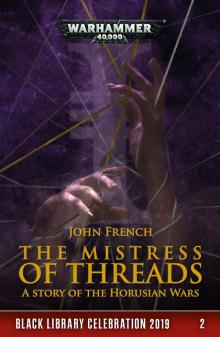 The Mistress of Threads - John French
The Mistress of Threads - John French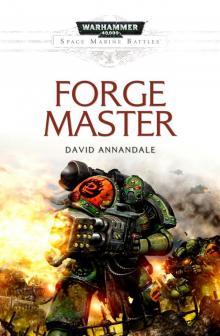 Forge Master - David Annandale
Forge Master - David Annandale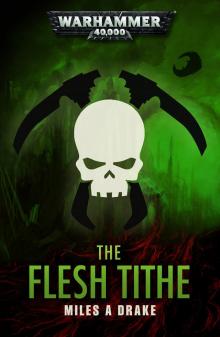 The Flesh Tithe - Miles A Drake
The Flesh Tithe - Miles A Drake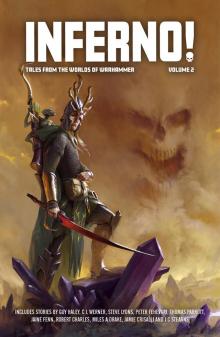 Inferno Volume 2 - Guy Haley
Inferno Volume 2 - Guy Haley Mercy of the Dragon - Nick Kyme
Mercy of the Dragon - Nick Kyme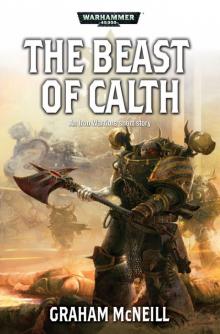 The Beast of Calth - Graham McNeill
The Beast of Calth - Graham McNeill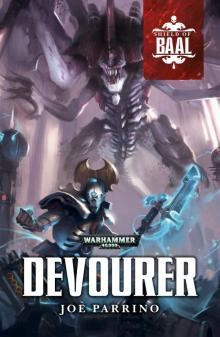 Devourer - Joe Parrino
Devourer - Joe Parrino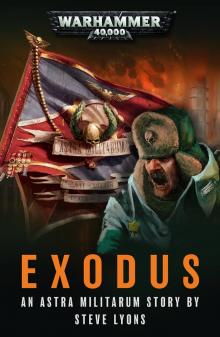 Exodus - Steve Lyons
Exodus - Steve Lyons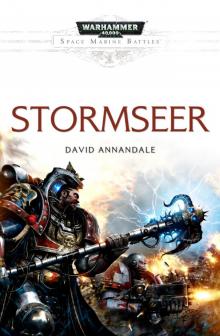 Stormseer - David Annandale
Stormseer - David Annandale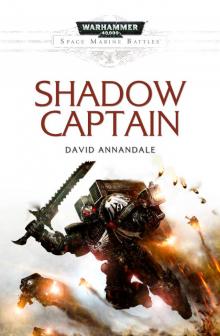 Shadow Captain - David Annandale
Shadow Captain - David Annandale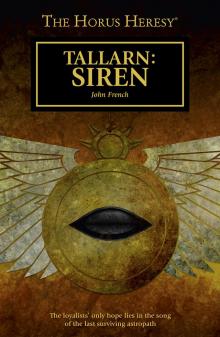 Tallarn- Siren - John French
Tallarn- Siren - John French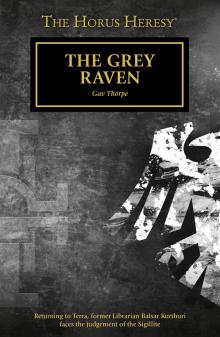 The Grey Raven - Gav Thorpe
The Grey Raven - Gav Thorpe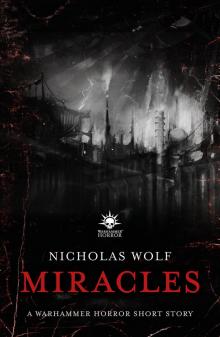 Miracles - Nicholas Wolf
Miracles - Nicholas Wolf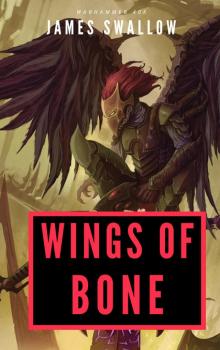 Wings of Bone - James Swallow
Wings of Bone - James Swallow